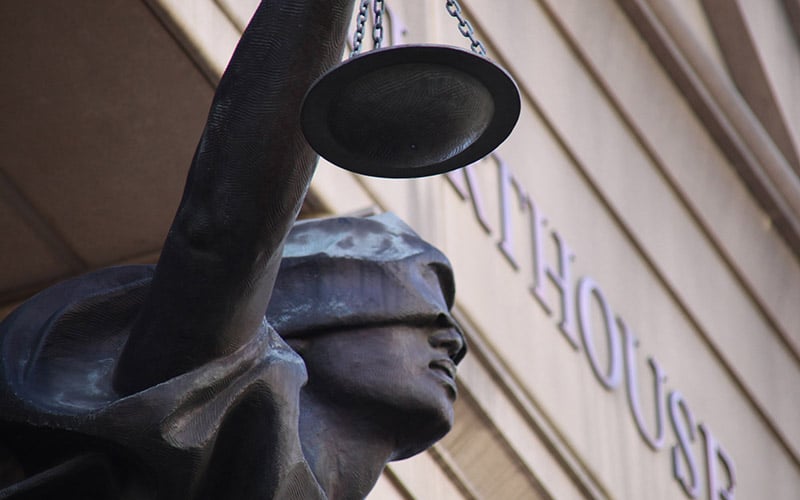- Slug: BC-CNS-Jail Mail,700
- File photo available (thumbnail, caption below)
By ALEXIS EGELAND
Cronkite News
WASHINGTON – Prisoners’ rights to confidential communication with their attorneys includes the right to watch jailers open some mail in front of them to make sure it’s not being read, a federal appeals court ruled Friday.
A three-judge panel of the 9th U.S. Circuit Court of Appeals said a lower court was wrong to dismiss Nick Mangiaracina’s lawsuit that charged Maricopa County officials with opening his case-related mail outside his presence.
The Maricopa County ruling was one of two opinions the court released Friday – the other was from Idaho – affirming inmates’ rights to have law-related mail opened in their presence.
Attorneys for the county did not immediately return requests for comment or declined comment on the case. But an official with the Prison Law Office in Berkeley, California, welcomed the ruling, which he said sets an important standard.
“Jails and prisons now have to make sure that when a correctional officer is opening legal mail, they have to do it in front of the prisoner to make sure that the mail is not read,” said Don Specter, executive director of the Prison Law Office.
“In prison, often the only way for prisoners to communicate confidentially with their lawyers is by mail, so that’s why it was such an important ruling,” he said.
Mangiaracina had seven criminal cases pending while he was being held in Maricopa County’s Fourth Avenue Jail. But he said he feared he could not privately discuss those cases with his attorney because his mail was being opened.
He said his “right to confidentiality and privacy was violated” and sued for violations of his First and Sixth Amendment rights.
While guards can open mail to look for contraband, the Maricopa County jail has a stated policy that it will only open mail related to legal matters in the presence of the inmate receiving the mail.
Mangiaracina’s suit cited nine separate instances from 2011 to 2013 in which he said his mail was delivered to him taped or stapled closed after being opened somewhere between its delivery to the prison mail room and his cell. In at least two of the instances, he filed grievances with the prison, complaining that his mail had been opened when he was not present.
The opinion by Circuit Judge Richard A. Paez said Mangiaracina was told by jail officials that the mailroom keeps track of any mail that is opened or damaged when it arrives, and all of his mail was sealed upon arrival.
There was no explanation as to how or why Mangiaracina’s mail was opened between its receipt at the jail and delivery to him. But Mangiaracina said one officer told him that guards could open any mail without notifying the prisoners, that opening mail from attorneys in front of the prisoners was a courtesy, not a requirement.
But the appeals court panel cited other circuits that said confidential communication between prisoners and attorneys is an “integral component of the judicial process.” The court said there are no security reasons to prevent a prisoner from being there when the mail is inspected to ensure that his mail is not being read.
Circuit Judge Jay S. Bybee said in a concurrence that he agreed with the panel’s finding that prisoners have that right to be present when mail from their attorneys is opened. But he wanted to make clear that for a lawsuit to be brought, the actions by prison officials must be “intentional, not merely negligent, acts depriving a party of his constitutional rights.”
Mangiaracina has not shown that the mail opening was intentional, but his case should be allowed to go forward, Bybee said. “He may or may not be able to prove his claim, but he has said just enough to get the opportunity,” he wrote.
Harry Williams, Mangiaracina’s attorney, said he was excited about the opinion because it has clarified a legal principle never before decided by the circuit, clarifying the issue for future cases.
“It establishes an important right,” Williams said. “That a prisoner must be able to communicate with their attorney without the government listening in, and that the government will face consequences if it tries to interrupt those communications.”
^__=
Web links:
_ Mangiaracina v. Penzone: http://cdn.ca9.uscourts.gov/datastore/opinions/2017/03/03/14-15271.pdf
_ Hayes v. Idaho Correctional Center: http://cdn.ca9.uscourts.gov/datastore/opinions/2017/03/03/14-35078.pdf
^__=
A federal appeals court, ruling in a Maricopa County jail inmate’s case, said prisoners’ right to confidential communication with their attorneys means guards have to open any legal-related letters in front of the inmate. (Photo by Tim Evanson/Creative Commons)
